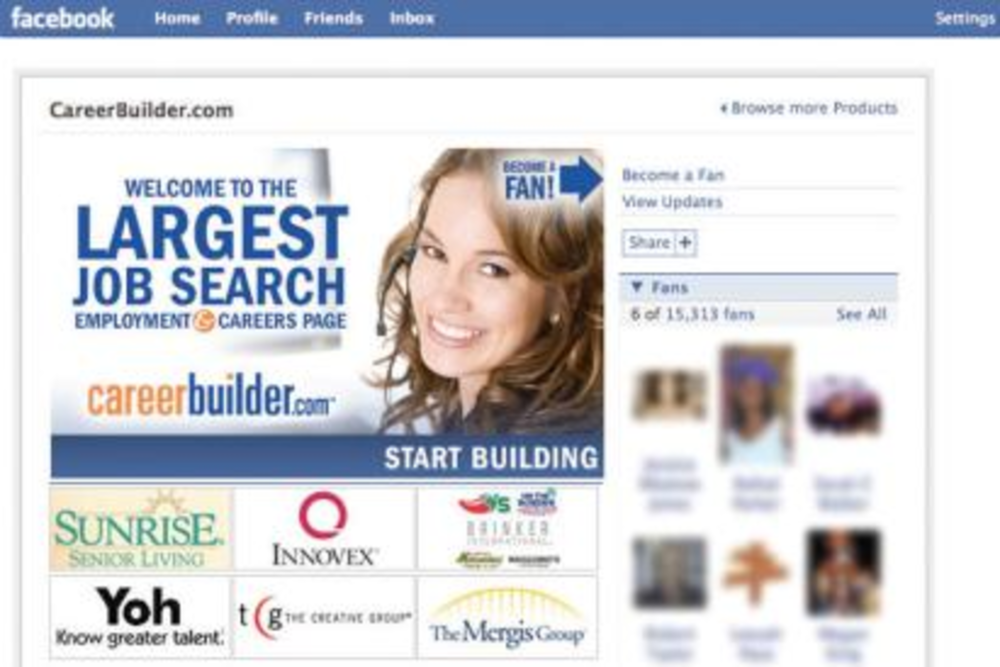Social networks such as Linked-In and Facebook have long been used for developing personal and professional connections online. However, in the wake of rampant job losses, the recruitment potential of the sites has skyrocketed, bolstered by increasing functionality and reach.
“I think we’ve only just scratched the surface of using social networking for job hunting,” said Matt Hicks, a spokesperson for Facebook. “People are now going beyond their direct network and reaching that next layer of people that may have an interest in getting a job with your company, but may be hard to reach through traditional media.”
The fact that many more people are out of work today than this time last year also means that more people are searching. The stock market’s nosedive prompted a tornado of job losses that left 533,000 people without jobs in the month of November alone.
Since December 2007, 2.7 million Americans have lost their jobs, according to the Bureau of Labor Statistics.
Jerry Bernhart, principal at Bernhart Associates, which along with the Direct Marketing Association publishes the Quarterly Direct Marketing Employment Survey, said the survey saw the biggest one-quarter drop in its eight-year history in October, and 17% of direct marketing firms surveyed were planning layoffs.
“It’s only gotten worse,” he said, “A lot has happened since October, so we expect the January results to be even higher.”
To put the link between professional social networking and the economy in perspective, US traffic to employment sites has increased 20% across the board over the past 13 weeks, compared with the same time period in 2007, according to Hitwise. Traffic to LinkedIn has increased 174%.
Because of the economic climate, it’s becoming more and more important for people to stay connected with their personal and professional networks, Hicks said.
“It’s harder to find jobs and times are tough,” he said. “People naturally want to stay in touch with the network not only to find the next job, but even to get advice.”
Job seekers aren’t the only ones benefiting from the social networks. Using these sites can give employers an upper hand when getting to know their candidates, according to Jeremiah Owyang, a senior analyst at Forrester Research. He notes that companies using Facebook have the ability to create interactive pages that can focus on recruiting, such as one created by Ernst & Young.
“The marketers can then gain access to see what these [prospective employees] are doing, what photos they’re uploading on Saturday morning and how they communicate with others. [They are] checking the behavior, not just the resume,” Owyang said, “These are telling tools that help you understand how these people will behave once you hire them.”
Additionally, Bernhart notes that on sites like LinkedIn, which touts its Jobs Insider tool that allows users to see their connections at companies that have job postings on major listing sites across the Web, users must create profiles that all their connections can see.
“This does away with some resume inflation,” he said. “People may be more inclined to be more truthful about what they put up [on their profiles].”
On Facebook, companies also can create applications and also use Facebook’s ad targeting system to reach their target. JP Morgan and CareerBuilder have Facebook apps.
Some smaller employers also are using social networks to find workers. Rob Abbott, founder and principal of Egg Haus, a San Francisco-based digital design firm, used Facebook ads to find candidates for a position opening earlier this year.
Using the information users choose to add to their personal profiles, Abbott was able to target Facebook users fitting only the criteria he was looking for — education, location, experience and even particular companies they’ve worked for. In this way, he noted, he was able to find not only those who might be looking for a job, but also passive candidates.
“We brought our hiring campaign to the community so we didn’t have to worry about the community coming to us,” Abbott said. “I found it much more rewarding and more of a challenge to find someone who has a job to come work for us instead of just finding someone who was [actively] looking for a job.”
Owyang agrees that social networks allow all parties involved to better search for and reach their target.
“Instead of having a broad, over-arching resume, these tools let people connect over detailed experiences so you can find the perfect fit for your role,” he said.
Experts agreed the key to a successful search and hire is complete integration.
“I think many employers don’t think about hiring from a strategic perspective, which is ironic because that’s what direct marketers are so good at,” Bernhart said. “You should approach hiring as you would a DM campaign. Use as many resources as possible and use social networking to enhance traditional recruiting methods. At the end of the day, searching for a job and finding the right candidate is really all about networking.”








